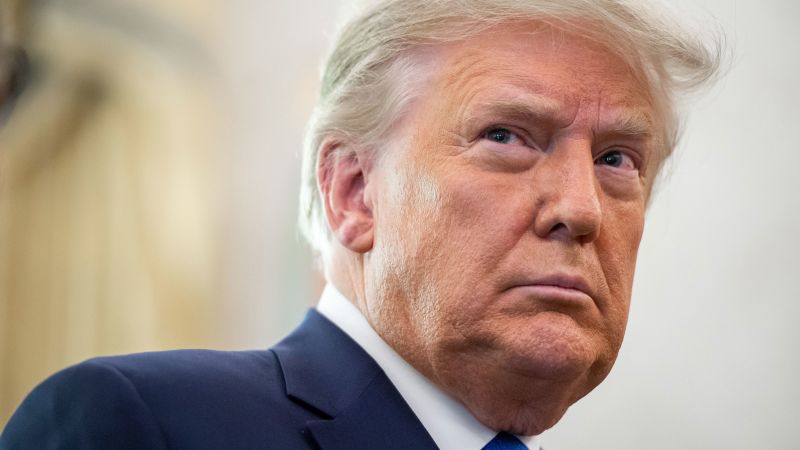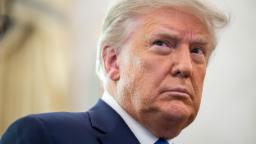

Washington
CNN
—
Former top national security officials have testified to a federal grand jury that they repeatedly told former President Donald Trump and his allies that the government didn’t have the authority to seize voting machines after the 2020 election, CNN has learned.
Chad Wolf, the former acting Homeland Security secretary, and his former deputy Ken Cuccinelli were asked about discussions inside the administration around DHS seizing voting machines when they appeared before the grand jury earlier this year, according to three people familiar with the proceedings. Cuccinelli testified that he “made clear at all times” that DHS did not have the authority to take such a step, one of the sources said.
Trump’s former national security adviser Robert O’Brien, in a closed-door interview with federal prosecutors earlier this year, also recounted conversations about seizing voting machines after the 2020 election, including during a heated Oval Office meeting that Trump participated in, according to a source familiar with the matter.
Details about the secret grand jury testimony and O’Brien’s interview, neither of which have been previously reported, illustrate how special counsel Jack Smith and his prosecutors are looking at the various ways Trump tried to overturn his electoral loss despite some of his top officials advising him against the ideas.
Now some of those same officials, including Wolf, Cuccinelli and O’Brien, as well as others who have so far refused to testify, may have to return to the grand jury in Washington, DC, to provide additional testimony after a series of pivotal court rulings that were revealed in recent weeks rejected Trump’s claims of executive privilege.
Cuccinelli was spotted going back into the grand jury on Tuesday, April 4.
Without that privilege shield, former officials must answer questions about their interactions and conversations with the former president, including what he was told about the lack of evidence for election fraud and the legal remedies he could pursue.
That line of questioning goes to the heart of Smith’s challenge in any criminal case he might bring – to prove that Trump and his allies pursued their efforts despite knowing their fraud claims were false or their gambits weren’t lawful. To bring any potential criminal charges, prosecutors would have to overcome Trump’s public claim that he believed then and now that fraud really did cost him the election.
“There’s lots of ways you can show that. But certainly one of them is if they were told by people who knew what they were talking about, that that there was no basis to take the actions,” said Adav Noti, an election law attorney who previously served in the US Attorney’s Office in Washington, DC, and at the Federal Election Commission’s general counsel’s office.
“I would not want to be a defense lawyer trying to argue, ‘Well, yes, my client was told that, but he never really believed it,’” Noti said.
Inside the Trump White House after the 2020 election, the push to seize voting machines eventually led to executive orders being drafted in mid-December of that year, directing the military and DHS to carry out the task despite Wolf and Cuccinelli telling Trump and his allies their agency did not have the authority to do so.
Those orders, which cited debunked claims about voting system irregularities in Michigan and Georgia, were presented to Trump by his former national security adviser Michael Flynn and then-lawyer Sidney Powell during a now-infamous Oval Office meeting on December 18.
Smith’s team has asked witnesses about that meeting in front of the grand jury and during closed-door interviews, multiple sources told CNN. Among them was O’Brien, who told the January 6 House select committee that he was patched into the December 18 meeting by phone after it had already devolved into a screaming match between Flynn, Powell and White House lawyers, according to a transcript of O’Brien’s deposition that was released by the panel.
O’Brien told the committee that at some point someone asked him if there was evidence of election fraud or foreign interference in the voting machines. “And I said, ‘No, we’ve looked into that and there’s no evidence of it,” O’Brien said he responded. “I was told we didn’t have any evidence of any voter machine fraud in the 2020 election.”
When asked about that meeting by federal prosecutors working for Smith, O’Brien reiterated that he made clear there was no evidence of foreign interference affecting voting machines, according to the source familiar with the matter.
O’Brien met with prosecutors earlier this year after receiving a subpoena from Smith’s team and is among the Trump officials who could be called back to discuss conversations with Trump under the judge’s recent decision on executive privilege.
Former Director of National Intelligence John Ratcliffe, who personally told allies of the former president that there was no evidence of foreign election interference or widespread fraud that would justify taking extreme steps like seizing voting machines, must also testify, the judge decided.
A spokesperson for Ratcliffe did not respond to CNN’s request for comment. Wolf declined to comment.
Cuccinelli acknowledged to the January 6 committee last year that, after the election, he was asked several times by Trump’s then-attorney Rudy Giuliani, and on at least one occasion by Trump himself, if DHS had authority to seize voting machines. Wolf told the committee he was repeatedly asked the same question by then White House chief of staff Mark Meadows.
Giuliani, who was subpoenaed by the Justice Department before Smith took over the investigation, previously acknowledged to the January 6 committee that he participated in that December 18 Oval Office meeting and other conversations about having DHS and the military seize voting machines.
Giuliani told congressional investigators that he and his team “tried many different ways to see if we could get the machines seized,” including options involving DHS, according to the transcript of his committee interview. Giuliani also acknowledged taking part in conversations – even before the Dec. 18 Oval Office meeting – where the idea of using the military to seize voting machines was raised.
“I can remember the issue of the military coming up much earlier and constantly saying, ‘Will you forget about it, please? Just shut up. You want to go to jail? Just shut up. We’re not using the military,’” he added.
Robert Costello, an attorney for Giuliani, told CNN that Giuliani has not received a subpoena from Smith. Costello said that in early November, Giuliani was subpoenaed by the DC US Attorney seeking documents and testimony. Costello says he told the Justice Department Giuliani couldn’t comply with the given deadlines because they were in the middle of disciplinary proceedings at the time. That was the last time Giuliani heard from DOJ, says Costello.
“I haven’t heard a word since November 2022,” Costello told CNN on March 30.
